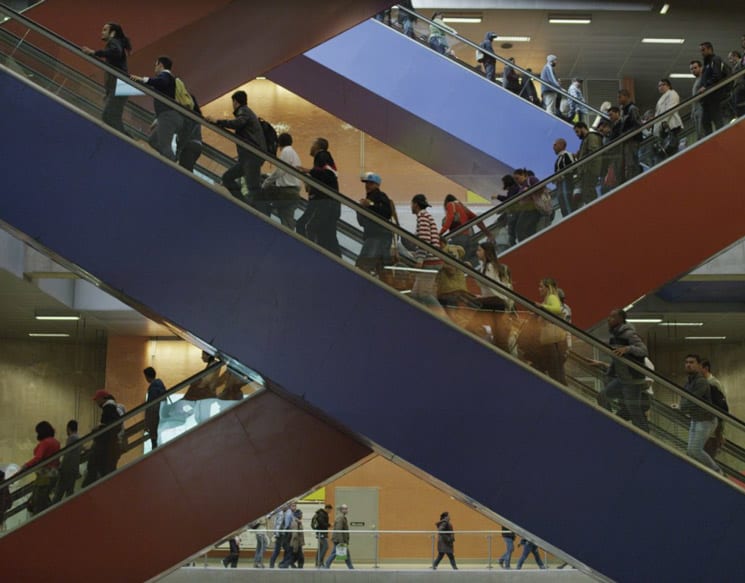Invention is director Mark Lewis' love letter to urban space, the vast and unchanging nature of art and architecture contrasted against the hustle and bustle of human life. It's a lovely exploration of the shape, form and texture of cities. As a nearly silent, 87-minute avant-garde film in TIFF 2015's Wavelengths program, Invention is well worth the watch for fans of stunning camerawork.
Opening on darkened monuments and stone statues that gradually reveal themselves in the light, each segment — Toronto's grey winters, the lush green beauty and history of Sao Paulo, and busy Paris tourists — contrast the stillness of art and architecture with the constant movement of human beings (and, by extension, the camera) against these unmoving landscapes. Highlighted or in silhouette, but never harshly, everything is illuminated with a gentle light that reveals Lewis' love for urban landscapes.
A particularly stunning shot slowly zooms to a darkened office window, revealing a woman standing in shadow. Eventually, the viewer is slowly brought through the glass and into the room with this woman, circling around to show us her view through the window of the cityscape below — in colour this time, instead of black and white. Her perspective gives this grey universe some life, and the camera begins to rotate in slow circles, much like the snow falling outside.
Lewis' camera is languid, circling around and lingering on statues, snow banks, forests, architecture and city streets. Extreme long shots of tiny people going about their day in vast urban spaces resemble tiny ants on a photograph, small and fragile in relation to the vast landscape. There's a reassurance here, too; no matter where we are, from Toronto to Sao Paulo to Paris, we look the same from afar
Even priceless works of art look dull and unreal, placed in the stillness of museums surrounded by the life and energy of human movement. The film's abrupt ending therefore becomes so shocking because, finally, human movement stops.
(NFB)Opening on darkened monuments and stone statues that gradually reveal themselves in the light, each segment — Toronto's grey winters, the lush green beauty and history of Sao Paulo, and busy Paris tourists — contrast the stillness of art and architecture with the constant movement of human beings (and, by extension, the camera) against these unmoving landscapes. Highlighted or in silhouette, but never harshly, everything is illuminated with a gentle light that reveals Lewis' love for urban landscapes.
A particularly stunning shot slowly zooms to a darkened office window, revealing a woman standing in shadow. Eventually, the viewer is slowly brought through the glass and into the room with this woman, circling around to show us her view through the window of the cityscape below — in colour this time, instead of black and white. Her perspective gives this grey universe some life, and the camera begins to rotate in slow circles, much like the snow falling outside.
Lewis' camera is languid, circling around and lingering on statues, snow banks, forests, architecture and city streets. Extreme long shots of tiny people going about their day in vast urban spaces resemble tiny ants on a photograph, small and fragile in relation to the vast landscape. There's a reassurance here, too; no matter where we are, from Toronto to Sao Paulo to Paris, we look the same from afar
Even priceless works of art look dull and unreal, placed in the stillness of museums surrounded by the life and energy of human movement. The film's abrupt ending therefore becomes so shocking because, finally, human movement stops.
